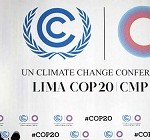When 194 countries meet for a conference on climate change and disperse with most nations claiming that they got something – it should be a triumph of diplomacy. But the weak agreement that beleaguered negotiators took home from the Conference of Parties (CoP) which concluded at Lima, on December 14, is quite the opposite.
United Nations officials and some governments, including India’s Minister of Environment, have praised the Lima deal largely because it was snatched from the jaws of defeat.
On December 11, one day before the conference was originally scheduled to end, negotiations almost broke down when developing countries found changes in the draft agreement that had been painstakingly negotiated over the previous ten days. The revised draft put developed nations at an advantage – primarily by watering down their responsibility.
In this context it is considered an achievement that all participating nations did agree on a final draft. This means there is now global unanimity on the need for climate action. Therefore the United Nations Framework Convention on Climate Change (UNFCC) has declared that the Lima deal puts the world on track for a more ambitious goal at a summit scheduled for December next year, in Paris, to cobble together a long term binding global agreement on climate change.
Environmental groups across the world have expressed dismay at the Lima agreement.
Chandra Bhushan, deputy director of the Centre for Science and Environment, New Delhi, described the Lima deal as a major setback for a meaningful agreement in Paris. “The principle of common but differentiated responsibility and respective capability (CBDR), the cornerstone of climate negotiations, has been further diluted and compromised, leading the way for developed countries to continue their high emissions,” Bhushan said. He added that the Lima summit will be remembered for “bad process, non-transparency and non-inclusiveness.”
Sam Smith, chief of climate policy for the World Wildlife Fund, was quoted by BBC as saying that: “The text went from weak to weaker to weakest and it’s very weak indeed.”
In a blog post titled “Limping home from Lima” Aldan Meyer director of policy and strategy for the Union of Concerned Scientists, a network based in Cambridge Massachusetts, said that “climate change is barreling ahead, but too many leaders are acting like we have all the time in the world.”
If the world stays on the path marked out by the recent U.S.-China bilateral agreement on reduction of emissions and the Lima agreement – average global temperature will rise above two degrees Centigrade. Beyond that threshold, scientists estimate, the scale of climate change is likely to be catastrophic.
Defenders of the Lima deal argue that getting the two biggest green house gas emitters, China and the U.S., to commit to the need for climate action is itself a huge achievement. Even more so since the recent Congressional election in the U.S. has empowered Republicans – many of whom still hold the view that climate change is not caused by human action.
Similarly, it is a reflection of how bad things are that a $10 billion addition to the UNFCC’s Green Climate Fund, agreed to at Lima, is cause for cheer. This fund is meant to support projects, programs, policies and other activities aimed at helping developing countries cope with climate change. By a conservative estimate $ 1 trillion is needed to be invested globally every year in post-carbon technology and business models.
Proceedings in Lima were largely clouded by the continuing unwillingness of the developed countries to be taken to account for their much higher per capita emissions. U.S. Secretary of State John Kerry emphasized that the developing world is now responsible for half the green house gas emissions. But the overwhelming majority of people live in the developing countries.
Bringing those billions out of poverty while also stemming climate change is a challenge that cannot be addressed in the framework established at Lima. The real battle that is brewing is over the lack of economic democracy – not just between nations but between the global north and global south.
Rajni Bakshi is Gandhi Peace Fellow, Gateway House
This blog was exclusively written for Gateway House: Indian Council on Global Relations. You can read more exclusive content here.
For interview requests with the author, or for permission to republish, please contact outreach@gatewayhouse.in.
© Copyright 2014 Gateway House: Indian Council on Global Relations. All rights reserved. Any unauthorized copying or reproduction is strictly prohibited


